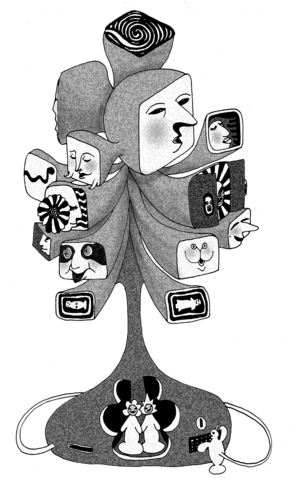Chinese online dating should have everything going for it -- vast numbers of singles, an even larger Internet population, and an ancient tradition for matchmaking.
Yet for most companies, profits seem as elusive as ever, and most are still looking for a business model that will turn all that romantic feeling floating around the Chinese Internet into tangible cash.
"How to make money is the problem for every Internet dating company in China," said Zhang Kuan, president of Jiaoyou.com, an online dating site.

"We're really struggling with this, and I think most Web sites are struggling with this," Zhang said.
There is no obvious reason why it should be so hard. With 110 million Internet users, and counting, China would appear to be brimming with potential for anything that can be traded online, including dates.
Even more important, the social and cultural context is being transformed in ways that would seem ideal for promoting online dating on a truly massive scale.
"Basically the social environment is changing and the number of Internet users is growing. Those are the key drivers," said Jason Tian (
Chinese men are increasingly moving from their home towns to large cities, where they have a limited social network to find a mate, according to Tian.
Uniquely, they are also part of the one-child generation -- the products of the most restrictive population policies in Chinese history -- giving them certain common characteristics.
"Parents became very tolerant. Children didn't know how to cooperate with others, how to tolerate others. They're very self-centered," Tian said.
"After they grow up, they find it's very difficult for them to change and adapt to another person," he said.
Based on factors like these, companies such as Shanghai-based consultancy iResearch estimate the online dating market could reach 653 million yuan (US$82 million) in 2008, up from 91 million yuan last year.
But realizing the potential will hinge partly on an industry-wide migration away from a free business model that relies on advertising revenues, executives said.
"We have to make a healthier industry here. At the end of the day high quality services cannot be free," said Li Song (
Executives said the principal challenge would be to build trust among potential customers who are accustomed to finding love the old way -- through introductions by family and friends.
The solution, according to the chief executive of the Web site eFriendsNet.com, Marine Ma (
eFriendsNet.com acts primarily as a social networking site where friends can link to each other's friends via a "relation chain" -- a service provided by many other sites such as Friendster of the US.
"We help the users, just like in the real world, to meet each other. Know each other, make friends, then date," he said.
eFriendsNet.com then charges a subscription fee for enhanced services such as the ability to chat with a potential date by mobile phone using a secure connection that protects both parties' identity.
"The most important thing is that we charge users to generate revenue, and we're profitable, that's quite different," he said.
Since the Web site's launch in February 2004, eFriendsnet.com has acquired nearly 5 million registered users, and last year booked nearly US$3 million in revenues.
Creativity is rewarded, but most believe it will be an uphill struggle for anyone venturing into the market.
One executive from a major Western Internet service said that while there is "a ton of money flying in [to China]," Chinese Internet dating firms have yet to discover a revenue model that works.

On May 7, 1971, Henry Kissinger planned his first, ultra-secret mission to China and pondered whether it would be better to meet his Chinese interlocutors “in Pakistan where the Pakistanis would tape the meeting — or in China where the Chinese would do the taping.” After a flicker of thought, he decided to have the Chinese do all the tape recording, translating and transcribing. Fortuitously, historians have several thousand pages of verbatim texts of Dr. Kissinger’s negotiations with his Chinese counterparts. Paradoxically, behind the scenes, Chinese stenographers prepared verbatim English language typescripts faster than they could translate and type them
More than 30 years ago when I immigrated to the US, applied for citizenship and took the 100-question civics test, the one part of the naturalization process that left the deepest impression on me was one question on the N-400 form, which asked: “Have you ever been a member of, involved in or in any way associated with any communist or totalitarian party anywhere in the world?” Answering “yes” could lead to the rejection of your application. Some people might try their luck and lie, but if exposed, the consequences could be much worse — a person could be fined,
Xiaomi Corp founder Lei Jun (雷軍) on May 22 made a high-profile announcement, giving online viewers a sneak peek at the company’s first 3-nanometer mobile processor — the Xring O1 chip — and saying it is a breakthrough in China’s chip design history. Although Xiaomi might be capable of designing chips, it lacks the ability to manufacture them. No matter how beautifully planned the blueprints are, if they cannot be mass-produced, they are nothing more than drawings on paper. The truth is that China’s chipmaking efforts are still heavily reliant on the free world — particularly on Taiwan Semiconductor Manufacturing
Keelung Mayor George Hsieh (謝國樑) of the Chinese Nationalist Party (KMT) on Tuesday last week apologized over allegations that the former director of the city’s Civil Affairs Department had illegally accessed citizens’ data to assist the KMT in its campaign to recall Democratic Progressive Party (DPP) councilors. Given the public discontent with opposition lawmakers’ disruptive behavior in the legislature, passage of unconstitutional legislation and slashing of the central government’s budget, civic groups have launched a massive campaign to recall KMT lawmakers. The KMT has tried to fight back by initiating campaigns to recall DPP lawmakers, but the petition documents they